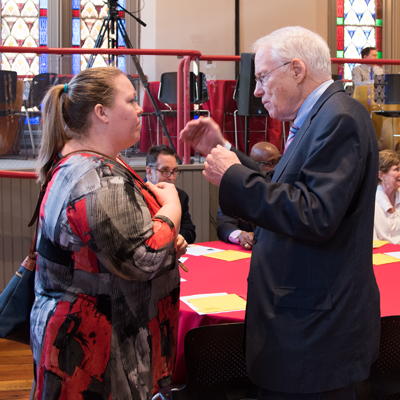Kirwan Aces Knowledge Discussion
Knowledge is something to celebrate, but it also comes with challenges. Such was the message of William E. “Brit” Kirwan, PhD, as the latest guest in the UMB Core Values Speaker Series.
Kirwan, who retired as chancellor of the University System of Maryland in June 2015, culminating a sterling 50-plus-year career in higher education, shared his thoughts with more than 200 people at Westminster Hall on April 1.
(View a photo gallery.)
“One of the best quotes I know about knowledge comes from Ben Franklin who once said an investment in knowledge always pays the best interest,” said Kirwan, who applauded UMB’s focus on core values such as knowledge and collaboration.
He spoke about how the University had been a personal presence in his life, with the School of Dentistry caring for his teeth and the School of Medicine treating his wife’s cancer and providing his knee replacement.
Kirwan opened the celebratory part of his speech by saying, “We’re fortunate to live in an era and a nation when the creation, application, and dissemination of knowledge has advanced the quality of life beyond what even our parents experienced.”
He mentioned many reasons to celebrate at UMB. Angela Brodie, PhD, discovering the go-to treatment for breast cancer. Robert Gallo, MD “turning AIDS from a death sentence into a manageable disease.” Claire Fraser, PhD’s advances in genomics. The work of the R Adams Cowley Shock Trauma Center team. “Of course, UMB’s expertise is not limited to the sciences,” Kirwan said, citing the School of Social Work’s efforts to fight homelessness and the Carey School of Law’s providing legal services for the poor.

Abree Johnson, a coordinator in the Shock, Trauma and Anesthesiology Research organized research center, chats with Kirwan at the Core Values Speakers Series presentation.
Then he got personal.
“Permit me a very personal but powerful story,” Kirwan said. “As some of you know, my wife was diagnosed with multiple myeloma five years ago. She has received extraordinary, compassionate care from the Greenebaum Cancer Center.”
He went on to detail how once she had exhausted her chemotherapy treatments she got into a clinical trial at UMB. “Rather than putting poisonous chemotherapy into the body, this new drug uses the body’s immune system to attack the cancer. After 16 weeks, Patti has been declared to be in remission,” he said to applause. “It’s a miracle made possible by the creation of knowledge right here at UMB.”
Introducing the second part of his speech, Kirwan said “if knowledge is such a good thing, how could there be challenges for our society?”
He pointed out how much more accessible knowledge is today. “Your smartphone contains more computing power than NASA had when the first astronaut took flight.”
The rate of acquiring knowledge also has soared. He said to double human knowledge once took 1,500 years. Then 250 and 150 years. “Today’s it’s doubling every 13 months.”
He said higher education needs to adapt to this change. No longer are students at the mercy of a book or the office hours of a library or professor to gain knowledge. “Now knowledge is one click away on Google,” said Kirwan, who began his career as a math professor at the University of Maryland, College Park in 1964.
“The nature of what is learned in the classroom needs to fundamentally change. Yes, we still need the professor. And he or she will still be a fount of knowledge. But only one of many founts of knowledge available,” he said. “What the classroom of the future needs is as the saying goes not a sage on stage but a guide on the side. Today’s students need to know how to pose questions, access, assess, and synthesize information in real time. And be able to work effectively in collaboration with others. The body of knowledge is simply too vast for anyone to be a final authority on any subject.”
Kirwan served as the fourth speaker in UMB’s Core Values Speaker Series. Best-selling author, attorney, and sports agent Ronald M. Shapiro, JD, kicked off the series by discussing civility on March 30, 2015. Norman R. Augustine, MSE, retired chair of Lockheed Martin, addressed leadership on May 11, and Peace Corps Director Carrie Hessler-Radelet, MS, spoke about collaboration on Oct. 15.
Bearer of two of higher education's most prestigious awards, the TIAA-CREF Theodore M. Hesburgh Award for Leadership (2010) and the Carnegie Corporation Leadership Award (2009), Kirwan has long been a proponent of increasing under-represented minorities' access to higher education.
In introducing Kirwan, UMB President Jay A. Perman, MD, said the former chancellor wrote the following just a few years ago:
“Deep within the makeup of this great nation is the belief that a person’s status at birth is not supposed to determine his or her status throughout life. It has always been education that provided the most effective and reliable path to a person’s full potential, taking them as far as their efforts and ambition will allow them to go.”
Kirwan addressed this subject toward the end of his 44-minute presentation. He said educational opportunity is an imperative in any discussion of knowledge.
“Wealth depends on knowledge acquisition through education. But access is not equal,” he said, citing that those born into the lowest income segment have an 8 percent chance of getting a college degree and those in the highest income segment have an 80 percent chance. “Too many children born into poverty have limited access to the knowledge they need. And then they have children born into poverty who face the same circumstance.”
He challenged the educators in the audience to work to find a lower-cost way to deliver a higher-quality education, streamlining the process and cutting student costs and burgeoning student debt. “Knowing this institution as I do, with knowledge and its creation, application, and dissemination as a core value, I’m putting my money down on UMB being a leader in helping our nation find solutions to this challenge.”



